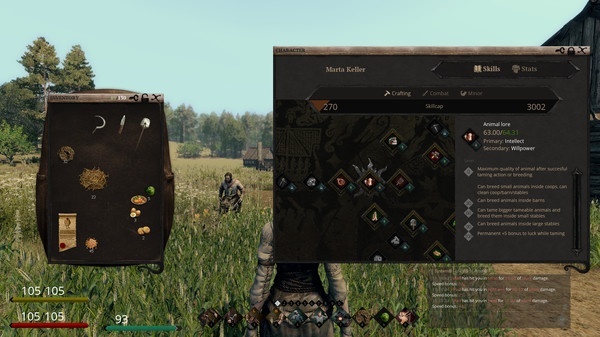Life is Feudal: Your Own (PC) Review
By Ian Soltes  09.12.2015
09.12.2015

World-building games like Minecraft are a dime a dozen and always end up playing out the same way. After sitting down and learning the basics, the player will always rush off to try and build towns, castles, or in-game functioning computers (No, really; that happened). Life is Feudal: Your Own takes that and tries to turn it into a major, lifelike community…with middling success.
Life is Feudal: Your Own is a fairly decent world-builder style game with a very unique twist. As with most world-builders, things such as crafting are very important to the goal of taking a wild and untamed land, sitting it down, and becoming its master. Much of this ends up happening as expected, with one major difference: it is nearly impossible for one player to accomplish the task of building a town on their own without serious effort or altering the game's initial rules. Why?
The game utilises an interesting stat system. At the start of the game the player is allowed to sit down and select a number of stats to allow to grow, stay the same level, or go down, with a set cap on how many total stats they can have. The idea is to make it so that each player and character ends up being unique. Someone who invested heavily in being a carpenter, for example, will likely be horrible in combat or stone crafting, and will have to rely on other players in order to make things work out. The carpenter may not be able to grow crops well, but another player skilled at crop-growing but not at woodworking might desire a chair, and thusly they trade, and, slowly, a community grows.

The problem with this setup should be self-evident. Namely, in order for it to work, an outright community is required! There are a lot of jobs and roles that need to be filled that one player simply cannot reasonably fill. Growing and production skills end up being vastly different than construction or combat, and all of these would need to be mastered for a single player to become self-sufficient on their own. This is not helped by the game's apparent obsession with details. For example, when building a house, it is important that every square of the house be on a flat and even plane. So before even starting construction, someone will need to go in and make sure everything is flat. Then another person will need to come in with the logging and/or carpentry, or stoneworking skills, all while being fed and potentially protected by soldiers. This promotes community play and is great for simulating life in a town, but is horrible without said community.
A small family hoping to play this game on their own, while they might be able to make headway, will ultimately end up stuck without the aid of an online community. In a way, this is a good thing, as it manages to set up a game where players can live their lives as feudal-era peasants, with nobility and the like higher up the ranks. The downside is that this is a game that can also turn the simple task of making a viable house into a multi-in-game-day affair, simply because the land isn't flat enough and people skilled at earth manipulation need to be brought in and supplies purchased and food provided. A community is required to get anything done.

Cubed3 Rating
Good
On its own, Life is Feudal: Your Own is little more than an interesting experiment. The sort of game to pick up once or twice and then put down in favour of others. The reason is the sheer starting cliff that must be scaled to get anything of merit and value going even for a group of players. On the upside, when everything works together, it leads to an interesting and thriving community where even the non-combat jobs can be enjoyable. On the downside, there needs to be quite a few people around to make it work in the first place.

![]() 6/10
6/10
![]() 0
(0 Votes)
0
(0 Votes)
 Out now
Out now  Out now
Out now  None
None  Out now
Out now Comments
Comments are currently disabled

 Sign In
Sign In Game Details
Game Details Subscribe to this topic
Subscribe to this topic Features
Features





 Top
Top

